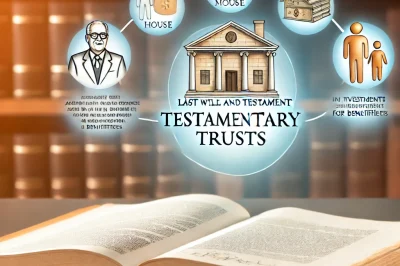Table of Contents

Article-at-a-Glance
- Testamentary trusts are not just for the wealthy; they can benefit anyone wanting to manage their estate effectively.
- Setting up a testamentary trust is not as complex as it seems and can be simplified with proper guidance.
- These trusts provide flexibility and protection for beneficiaries, ensuring their needs are met over time.
- A testamentary trust complements a will by offering additional control over asset distribution.
- Understanding the benefits and setup process of testamentary trusts can enhance your estate planning strategy.
Understanding UK Testamentary Trusts
When it comes to managing your estate, understanding the tools at your disposal is crucial. One such tool is the testamentary trust, a powerful mechanism that can help you ensure your assets are distributed according to your wishes after you pass away. But what exactly is a testamentary trust, and why might it be beneficial for you?
Basic Definition and Purpose
A testamentary trust is a legal arrangement specified in a will that comes into effect upon your death. Its primary purpose is to manage and protect your assets for the benefit of your beneficiaries, typically children or dependents, over a specified period. This type of trust allows for greater control over how and when your assets are distributed, providing peace of mind that your loved ones will be cared for according to your intentions.
How Testamentary Trusts Differ from Other Trusts
Unlike living trusts, which are established during your lifetime, testamentary trusts are created as part of your will and only take effect after you pass away. This distinction is important because it means that testamentary trusts are subject to probate, a legal process that validates the will and oversees the distribution of the estate. Despite this, testamentary trusts offer unique advantages, such as flexibility in managing assets and potential tax benefits.
Common Misconceptions About Testamentary Trusts
There are several myths surrounding testamentary trusts that can deter individuals from considering them as part of their estate planning strategy. Let’s address some of these misconceptions to help you make informed decisions.
Myth: Only for the Wealthy
One of the most pervasive myths is that testamentary trusts are only suitable for the wealthy. This couldn’t be further from the truth. Testamentary trusts are designed to cater to a wide range of financial situations, offering benefits to anyone who wants to ensure their assets are distributed according to their wishes. Whether you have a modest estate or substantial wealth, a testamentary trust can be tailored to meet your specific needs and objectives.
Myth: Too Complex to Set Up
Another common misconception is that setting up a testamentary trust is overly complicated. While it’s true that the process involves legal considerations, it is not insurmountable. With the guidance of a knowledgeable estate planner or solicitor, you can navigate the setup process smoothly. The key is to clearly define your objectives and work with a professional who can help you structure the trust to align with your goals.
Example: Sarah, a single mother, wanted to ensure her two children were financially secure after her passing. Despite having a modest estate, she set up a testamentary trust that allocated funds for their education and living expenses. With the help of her solicitor, Sarah was able to establish a trust that provided for her children’s needs without overwhelming legal complexity.
Myth: Restricts Beneficiaries’ Access to Assets
Some people believe that testamentary trusts limit beneficiaries’ access to their inheritance. In reality, these trusts offer flexibility in asset distribution, allowing you to set conditions that reflect your intentions. For example, you might stipulate that funds are released for educational purposes or specific life events, ensuring that the assets are used responsibly. To understand more about these trusts, you can explore common misconceptions about UK asset property trusts.
Myth: Unnecessary if There’s a Will
Many people assume that having a will negates the need for a testamentary trust. However, a will and a testamentary trust serve different purposes and can complement each other in your estate plan. While a will outlines how your assets should be distributed, a testamentary trust provides additional control over the timing and conditions of that distribution. This is particularly beneficial if you have young children or dependents who may not be ready to manage a large inheritance responsibly.
Consider this: a will might specify that your estate be divided equally among your children. But what if one child is still a minor, or another has special needs? A testamentary trust allows you to tailor the distribution of assets to suit each beneficiary’s circumstances, ensuring that their unique needs are met without compromising their financial future.
Benefits of Testamentary Trusts
Testamentary trusts offer several advantages that can enhance your estate planning strategy. Understanding these benefits can help you decide whether a testamentary trust is the right choice for your situation. For more insights, explore the common misconceptions about UK asset property trusts.
Providing for Minors and Dependents
One of the primary benefits of a testamentary trust is its ability to provide for minors and dependents. By setting up a trust, you can ensure that your children or other dependents receive financial support until they reach a certain age or achieve specific milestones, such as graduating from university or starting a career.
For example, you might decide that your children will receive their inheritance in installments, with a portion released when they turn 18, another portion at 25, and the remainder at 30. This approach not only provides financial security but also encourages responsible financial management as they mature. For more information on securing assets, consider exploring UK asset protection trusts.
Example: John’s estate plan included a testamentary trust for his three children. The trust stipulated that each child would receive funds for their education and living expenses until they turned 25, at which point the remaining assets would be distributed equally. This arrangement ensured that John’s children were supported during their formative years without overwhelming them with a large inheritance.
By providing for minors and dependents in this way, testamentary trusts offer peace of mind that your loved ones will be cared for according to your wishes.
Protecting Assets from Creditors
- Testamentary trusts can shield assets from creditors, safeguarding your beneficiaries’ inheritance.
- By holding assets in a trust, you can protect them from claims made against your beneficiaries, such as in the event of bankruptcy or divorce.
- This protection ensures that your hard-earned assets remain with your intended beneficiaries, regardless of their financial circumstances.
Asset protection is a crucial consideration for anyone looking to preserve their estate for future generations. By utilizing a testamentary trust, you can ensure that your beneficiaries receive the full benefit of their inheritance, free from external financial pressures.
Most importantly, testamentary trusts provide a level of security that can help you sleep easy, knowing that your estate is protected from unforeseen financial challenges.
Tax Efficiency and Estate Management
Testamentary trusts can also offer tax advantages, making them an attractive option for efficient estate management. By structuring your trust strategically, you can potentially reduce the tax burden on your estate and your beneficiaries. This might involve utilizing tax allowances and exemptions, or distributing income to beneficiaries in a tax-efficient manner.
Furthermore, a testamentary trust can streamline the management of your estate, ensuring that your assets are administered according to your wishes. This can be particularly beneficial for complex estates, where a clear plan is essential to avoid disputes and ensure a smooth transition of wealth. For more insights on estate planning, explore the differences between UK asset protection trusts and traditional wills.
Setting Up a Testamentary Trust
Now that we’ve explored the benefits of testamentary trusts, let’s delve into the process of setting one up. While it may seem daunting at first, following a structured approach can simplify the process and help you establish a trust that meets your needs.
Steps in the Setup Process
Setting up a testamentary trust involves several key steps:
- Define Your Objectives: Clearly outline what you want to achieve with your trust, such as providing for minors or protecting assets.
- Consult a Professional: Work with an estate planner or solicitor who can guide you through the legal and financial aspects of setting up the trust.
- Draft the Trust: Create a detailed trust document that specifies the terms and conditions of the trust, including how assets will be managed and distributed.
- Choose a Trustee: Select a trustworthy individual or institution to manage the trust and ensure your wishes are carried out.
- Include the Trust in Your Will: Ensure that the trust is properly incorporated into your will, so it takes effect upon your passing.
By following these steps, you can set up a testamentary trust that aligns with your estate planning goals and provides security for your beneficiaries.
Choosing a Trustee
Choosing the right trustee is a critical decision in the setup process. The trustee will be responsible for managing the trust and ensuring that your wishes are fulfilled, so it’s important to select someone who is trustworthy, reliable, and capable of handling financial matters.
Consider the following when choosing a trustee:
- Trustworthiness: Select someone you trust implicitly to act in the best interests of your beneficiaries.
- Financial Acumen: Ensure the trustee has the necessary skills and experience to manage the trust effectively.
- Availability: Choose someone who has the time and willingness to fulfill their responsibilities as trustee.
Besides that, you might consider appointing a professional trustee, such as a solicitor or a trust company, especially if your estate is complex or if you want to ensure impartiality in the management of the trust.
Example: Emily appointed her brother, a financial advisor, as the trustee of her testamentary trust. His expertise in financial management and his deep understanding of Emily’s wishes made him the ideal choice to oversee the trust and support her children after her passing.
By carefully selecting a trustee, you can ensure that your testamentary trust is managed effectively and your beneficiaries are well cared for.
Drafting and Legal Requirements
Drafting a testamentary trust requires careful consideration and attention to detail. It involves creating a legally binding document that specifies how your assets will be managed and distributed after your death. This document is typically included as part of your will, ensuring that the trust is established according to your wishes.
It’s important to work with a qualified estate planner or solicitor when drafting a testamentary trust. They can help you navigate the legal complexities and ensure that the trust is structured correctly. This includes defining the terms and conditions of the trust, such as the distribution schedule, any conditions beneficiaries must meet, and the powers granted to the trustee. For more insights, you can explore common misconceptions about UK asset property trusts.
Final Thoughts on Utilising Testamentary Trusts
Testamentary trusts are a valuable tool in estate planning, offering a range of benefits that can enhance your ability to manage and distribute your assets effectively. They provide a level of control and flexibility that can be particularly beneficial if you have specific goals for your estate, such as providing for minors or protecting assets from creditors.
Understanding the myths and misconceptions surrounding testamentary trusts is crucial to making informed decisions about your estate plan. By dispelling these myths, you can appreciate the true value that testamentary trusts offer and consider how they might fit into your overall strategy.
Whether you’re looking to provide for your children, protect your assets, or ensure tax efficiency, testamentary trusts can be tailored to meet your unique needs. By working with experienced professionals and taking the time to carefully plan your estate, you can create a testamentary trust that reflects your wishes and secures your legacy for future generations. For more insights, explore the tax implications of UK asset trusts.
When to Consider a Testamentary Trust
Consider setting up a testamentary trust if you have young children or dependents who may need financial support after your passing. A trust can ensure that their needs are met and provide for their education and upbringing until they reach adulthood.
You should also consider a testamentary trust if you want to protect your assets from potential creditors or if you have specific goals for how your estate should be managed and distributed. This can provide peace of mind that your assets will be used according to your intentions, regardless of external financial pressures.
Expert Tips for Effective Estate Planning
Here are some expert tips to help you plan your estate effectively:
- Start Early: Don’t wait until it’s too late to start planning your estate. The earlier you begin, the more options you’ll have for structuring your plan.
- Consult Professionals: Work with qualified estate planners, solicitors, and financial advisors to ensure your plan is comprehensive and legally sound.
- Review Regularly: Your estate plan should be a living document that evolves with your circumstances. Review and update it regularly to reflect changes in your life and financial situation.
- Communicate Clearly: Discuss your plans with your beneficiaries and trustees to ensure they understand your wishes and are prepared to carry them out.
Frequently Asked Questions
What are the tax implications of a testamentary trust?
Testamentary trusts can offer tax advantages, particularly when it comes to income distribution. The income generated by assets held in a testamentary trust is typically taxed at the beneficiary’s marginal tax rate, which can be lower than the trust tax rate. This can result in significant tax savings, especially if the beneficiaries are minors or have lower incomes. For more on trust structures, explore our guide on understanding UK asset protection trusts.
It’s important to work with a tax advisor to understand the specific tax implications of your testamentary trust and how to maximize its tax efficiency. They can help you navigate the complex tax rules and identify opportunities for minimizing your estate’s tax burden.
In addition, testamentary trusts can be structured to take advantage of various tax allowances and exemptions, further enhancing their tax efficiency. By carefully planning your trust’s structure and distribution strategy, you can ensure that your estate is managed in a tax-effective manner.Can a testamentary trust be contested?
Like any part of an estate plan, a testamentary trust can be contested under certain circumstances. Common grounds for contesting a trust include claims of undue influence, lack of testamentary capacity, or improper execution of the will.
To minimize the risk of a contest, it’s essential to ensure that your will and trust are drafted clearly and in accordance with legal requirements. This includes obtaining proper witness signatures and ensuring that the document reflects your true intentions. For further understanding, you might explore the legal challenges in setting up trusts.
Involving a solicitor in the drafting process can help safeguard against potential challenges by ensuring that your testamentary trust is legally sound and properly executed. Additionally, maintaining open communication with your beneficiaries can help prevent misunderstandings and reduce the likelihood of disputes.
Testamentary trusts in the UK are often misunderstood, leading to numerous misconceptions. These trusts are set up through a will and only come into effect after the death of the person who created the will. One common myth is that they are only for the wealthy, but in reality, they can be beneficial for anyone looking to manage their estate effectively. It’s important to understand the common misconceptions surrounding these trusts to make informed decisions about estate planning.
- What Happens If There’s No Will? Intestacy Rules Explained – 24 January 2026
- Can a Solicitor Speed Up Probate? When Professional Help Makes Sense – 21 January 2026
- Probate vs Letters of Administration: Swansea Legal Solutions Explain the Differences? – 18 January 2026






